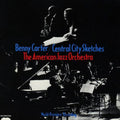FEATURED SELECTION: A TRUE TALENT - Benny Carter & the American Jazz Orchestra
FEATURED SELECTION: A TRUE TALENT - Benny Carter & the American Jazz Orchestra
The MHS Review 406, VOL. 12, NO. 10 • 1988
A True Talent
by Spencer Bennett
Why are we Americans always astonished by what old age can accomplish? In other cultures maturity signifies wisdom, sagacity, perspective, and the substance of continuity with the past. Here it has something to do with golf courses in Arizona and Florida where none of the rest of the working world lives. And yet ... We just celebrated the one hundredth birthday of Irving Berlin, who has not been matched in the century for the variety and endurance of his compositions. Paul Tillich didn't begin his multi-volume Systematic Theology until his mid-50s and didn't finish until his late 60s. And, to return to music, Aaron Copland is highly respected as a contemporary composer in his later years. Even George Bums, at 92, makes a joke of his mortality, but does so not with wistfulness but with a knowledgeable twinkle that he plays the everyman to our own (so-called) declining years.
I bring this up because jazz has been touted as a young man's art. This "they play hard and die young" legend started with Bix Beiderbecke and continued through Charlie Parker's untimely death. But both Ellington and Basie lived well into their 70s and died in the midst of their careers rather than in retirement. Ditto the late Woody Herman. Some have said that all three were past their prime. If that is debatable, the following isn't. Benny Carter, who is now 81, proves on this album that a man in his later years can be a consummate jazz composer, arranger, and active musician.
Carter comes out of the same school of elegance and grace that graduated Duke Ellington. He was a student at Wilberforce College before entering the world of jazz in the '20s, and that flirtation with college contributed to a man who is well mannered, understated, and meticulous in appearance and musical arrangement. Carter paid his dues in the rough and tumble days of the '30s with the giant bands of Fletcher Henderson, Chick Webb, William McKinney, and Duke Ellington. But he was and is always the gentleman, and it is to his credit that all of the above-mentioned artists recognized a true talent for designing sophisticated, flavorful compositions in the midst of so many egos clamoring for attention. What we are talking about here is impeccable taste and public civility. The guys were standing in line to play on this new one just to be part of the tribute to one of the greats.
This is a player who takes a backseat to none of the young lions and who solos on virtually every piece on the album. His improvisations are clean, long flowing lines of melodic texture, full of ideas but above all full of the flow necessary to keep the idea of a piece alive. This is especially true of the poignant ballad "Souvenir," in, which Carter sustains the mood of a long languorous blues with a tonality that bespeaks a half century's familiarity with Manhattan streets at midnight. What strikes me about this maturity is that the statements are pensive, gentle, urbane, and sad without bitterness. This is an alto sax man who knows the meaning of culture.
Or take Carter the arranger. Who says that we lose our flexibility in old age? There are two cuts of "Doozy" here (originally a blues made famous on his 1961 album Further Definitions). The second version boasts a masterful job of editing, so that we get just the right punctuation by brasses and reeds for a breakneck exchange of exciting four-bar solos by Schoenberg and Tabackin. But the first version contains a middle section of ensemble reed playing that takes the original theme and plays with it for 40 bars of dips and sweeps without ever once losing the thread of continuity. What Carter tells us is that the written line in jazz can be just as exciting as the improvised solo and that he is a genius at providing the context for both. After all, a gentleman does not rely upon a cliche when he writes a scenario.
Finally, there is Benny Carter the composer. "Central City Sketches" is a suite of impressionistic pieces about New York that features a lot of leisurely interplay between reeds and brasses and some nice surprises: Carter's crisp trumpet playing, for one. The midsection "Promenade" picks up the pace and reveals the love Carter has for ensemble writing, where saxes and trumpets respond to each other with their own ideas of conversation as they take this walk through the city together. It is here, I would argue, that Carter sustains our interest because he has been so much a part of the history of jazz without losing his natural instinct for modernity. We get echoes of Basie and Ellington, but also the lesser-known bands without sacrificing the sophisticated stylings of contemporary jazz. I can hardly wait to hear what Benny Carter will give us in the next ten years.



